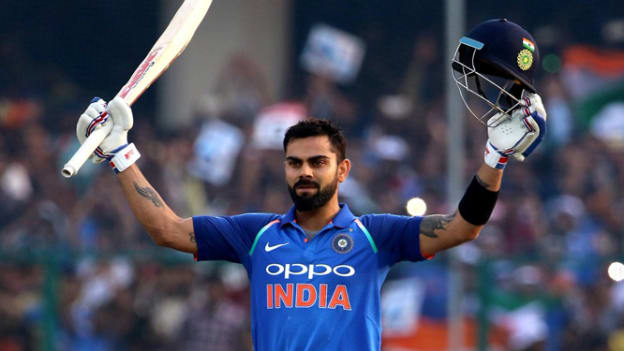Virat Kohli's historic milestone: Unveiling his evolution from flamboyant performer to exemplary leader

With 50 centuries in one-day internationals, Virat Kohli set a new record by surpassing Sachin Tendulkar's 49 centuries. The Master Blaster had held the record since September 1998 when he overtook Desmond Haynes' 17 centuries. As we celebrate this historic milestone, it's evident that Kohli's journey to success encompasses not only his incredible batting prowess but also his adept leadership. Reflecting on a powerful quote that struck a chord - Leadership is nothing, but communication.
This phrase resonated deeply during a recent leadership training I attended. As a first-time manager, absorbing and implementing this lesson became paramount in my learning process.
The trainer started with the premise,"Leadership is nothing, but communication." Initially, all the participants argued that while communication plays a major role in leadership, there are other elements to the art of leading as well. The debate ensued, but within ten minutes, everyone was in agreement.
During the lunch break, the conversation started about the weekend plans and most of us had only one thing on our mind. India vs Pakistan. Nothing else mattered. Somehow, the conversation changed from the match to the leadership style of Virat Kohli, the current captain of the Indian cricket team. And it got me thinking.
Virat Kohli’s journey has been phenomenal. From playing in the bylanes of West Delhi to becoming a top individual performer to leading a country’s team on an international level. He has done it all. From being the pioneer for promoting individual fitness to achieving the highest sporting honor in India, he has done it all. But the biggest transformation has been from Virat Kohli--a talented, flamboyant individual to a leader with an intense focus on fitness and work-ethic. From an individual performer to leading the team to the greatest accolades.
As the training resumed after the lunch break, I could see a lot of parallels in what was being shared and Kohli's leadership story. During the training, these principles were being discussed. The principles are the core behaviors that make leaders and associates effective:
- Maintain or enhance self-esteem.
- Listen and respond with empathy.
- Ask for help and encourage involvement.
- Share thoughts, feelings, and rationale (to build trust).
- Provide support without removing responsibility (to build ownership).
We all know, cricket is a team sport. Despite the individual brilliance of a leader, the team will fail if other players are not inspired or engaged enough to a higher level of performance. Here we look at how he has used the above core principles at various stages and has enabled the team to be a force to be reckoned with:
Maintain or enhance self-esteem
Sports can be very cruel. The fortunes of a player can flip completely in a matter of minutes/days - from a hero to a villain and vice versa, in no time. It becomes very important then, as a leader, to back the players when they need it the most. And Kohli has done that wonderfully. Kuldeep Yadav was awfully out of touch before the World Cup. He had not met expectations during the IPL and there was criticism coming in from some quarters as to his selection in the World Cup squad. This is how Kohli took care of the situation:
"In hindsight, if you look at it, someone like Kuldeep who has had so much success, it is important to see a period where things don't go your way. We are glad that it happened in the IPL rather than during the World Cup.”
A classic example of how he was able to boost the self-esteem of an important player. Kuldeep Yadav proved to be a crucial cog in turning the match against Pakistan by taking important wickets at crucial junctures.
Listen and respond with empathy
It is important for a leader to understand and empathize with the resources at hand. Indian pitches are a fast bowler’s nightmare. While his predecessors mostly relied on the spinners to turn the game in Indian conditions, Kohli has eagerly listened to and backed the fast bowlers to change the game even on flat Indian tracks.
Empathizing whenever things have not gone well and supporting them at every juncture is what he has done right as a leader.
“We don't play only spinners, we play fast bowlers as well,” the skipper said after the win over England in Vizag. “We understand their contribution is also important.”
And the added effort paid off and how: the trio of Jasprit Bumrah, Ishant Sharma and Mohammed Shami took the most wickets by a pace trio in a calendar year in Test cricket.
Ask for help and encourage involvement
One of the biggest changes under Virat's captaincy has been the emergence of India as a team with a great bowling line-up. As someone had said, batting wins you matches, bowling wins you tournaments. A part of the success can be attributed to the freedom given by the captain to bowlers for setting their own fields and involving them in making a strategy to get the opposition batsmen out. Here is what Umesh Yadav had to say:
"Virat is a bowler's captain. He is someone who would throw the ball at you and tell you to set your own field. He asks me what my plan is or whether I need a particular fielder at a position. He backs your instinct and plans. Only if the plan doesn't work, he would come up and tell that let's try this. For him, the bowler gets to execute Plan A and if it doesn't click, then Plan B," Umesh told PTI in an exclusive interview.
Share thoughts, feelings, and rationale (to build trust)
Virat may have done exceptionally well as a leader in the Indian National team outfit. But, his leadership skills have been questioned a lot whenever he has played for his franchise, The Royal Challengers Bangalore a.k.a RCB. The team as a whole failed to perform, but what proved Kohli's leadership skills is his acknowledgment of the poor decision making:
"The failure lies where decisions aren't made properly," Kohli said, as quoted by ESPNcricinfo. If I sit here and say our luck was bad, that won't be right. You make your own luck, and if you make poor decisions and the other team makes good ones, you will lose. When we played big matches too, our decision-making wasn't right."
Provide support without removing responsibility (to build ownership)
India has had to fight their own demons in the past in their overseas tours. Majority of the failures in these tours can be attributed to the failure of our batting unit. But, Virat's Indian team has managed to do consistently well outside India. There have been times though, where they have failed to turn up and this is what he had to say after they were 0-2 down to England because of the failure of the batting unit.
“The batsmen will still have to take responsibility and put runs on the board. If you don’t pick 20 (wickets), as I have said in the past, you can score as many runs as you want. It is not about saving one discipline, it is about one discipline taking responsibility of their job and the other discipline taking responsibility of theirs. But both possibilities are there looking at how exciting or how spicy the pitch is going to be.”
There is still a long way to go for Virat Kohli as a leader, but the signs have been positive. From a highly aggressive, flamboyant individual performer to a leader par excellence.











